Algebra tutoring significantly improves student performance, with personalized instruction addressing the gateway nature of algebra courses, which are crucial for high school graduation and college success.
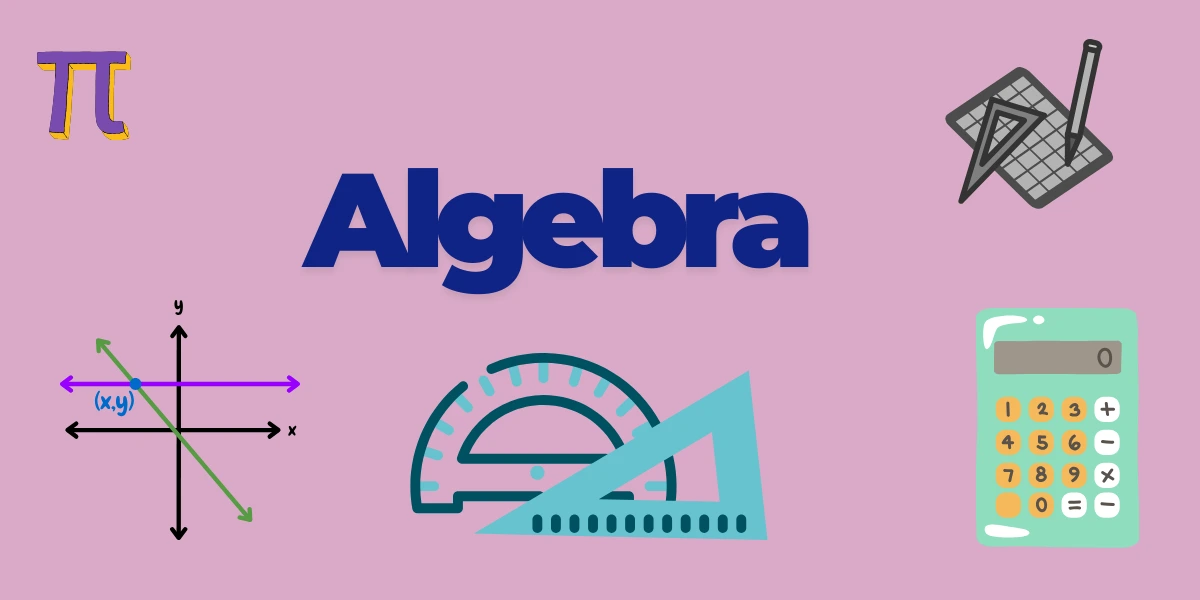
Introduction: The Algebra Challenge
Sarah, a sophomore at a California high school, stared at her algebra homework with mounting frustration. Like approximately 40-60% of students taking algebra courses, she struggled to grasp concepts that seemed increasingly abstract and disconnected from her daily life. Her story is not unique, across the United States, United Kingdom, and Gulf regions, students face similar challenges with algebra, often viewing it as an insurmountable barrier rather than a stepping stone to academic success.
The stakes are incredibly high. To visualize just how critical this subject is for a student’s future, let’s look at the data linking algebra mastery to graduation rates.
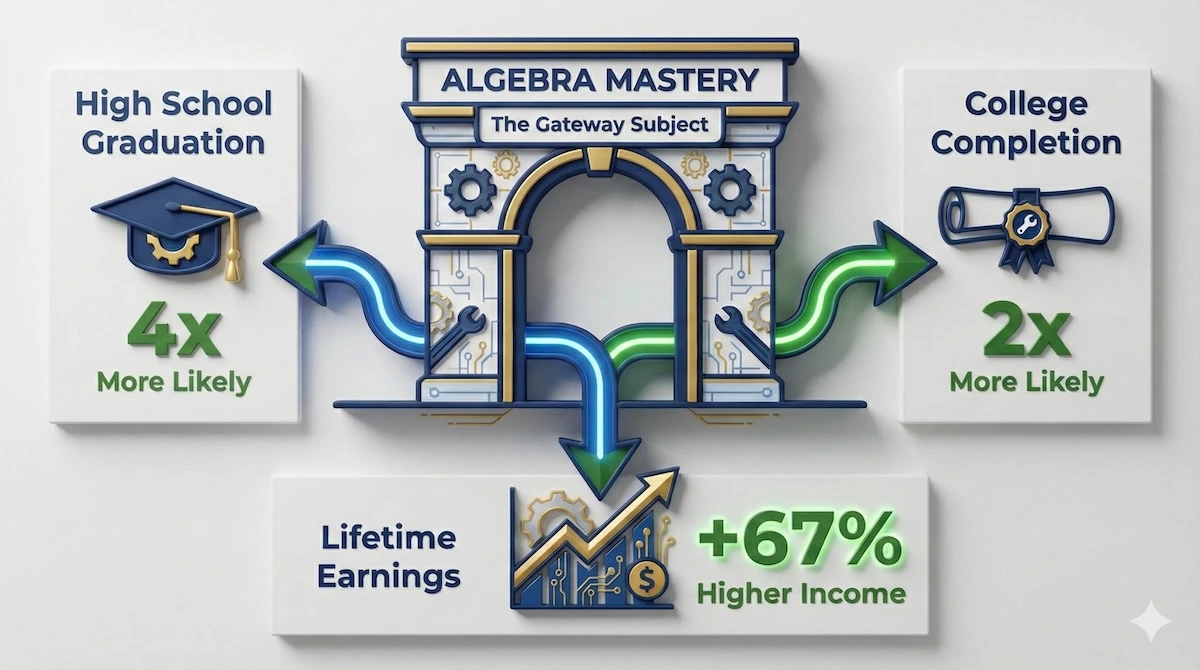
Mastering algebra is the single biggest predictor of future academic and financial success.
As these statistics show, falling behind in algebra doesn’t just lower a GPA—it significantly reduces the likelihood of earning a college degree and achieving higher lifetime earnings.
The importance of algebra extends far beyond the classroom. Research consistently demonstrates that students who master Algebra I are four times more likely to graduate from high school, while those completing Algebra II are twice as likely to graduate from college. These statistics underscore a fundamental truth: algebra serves as a critical gateway course that shapes educational trajectories and lifetime opportunities.
Understanding Algebra as a Gateway Course
The Mathematics Foundation
Algebra represents more than a collection of equations and formulas; it constitutes the foundation for mathematical reasoning and problem-solving skills essential in numerous academic disciplines and professional fields. According to the National Center for Education Statistics, gateway mathematics courses significantly influence student persistence, with 48% of community college students who passed gateway math courses in their first year graduating within six years, compared to only 18% of those who did not.
The challenge becomes particularly pronounced when considering that many students arrive at algebra courses with significant gaps in their mathematical preparation. Studies indicate that students often struggle with fundamental concepts including negative integers, the distributive property, and the proper application of the order of operations (BODMAS). These foundational weaknesses create cascading effects that make algebraic concepts increasingly difficult to master.
Think of math as a tower of bricks. When a foundational brick like ‘negative numbers’ is cracked, the entire structure becomes unstable. Here is how a simple error spirals into a wrong answer:
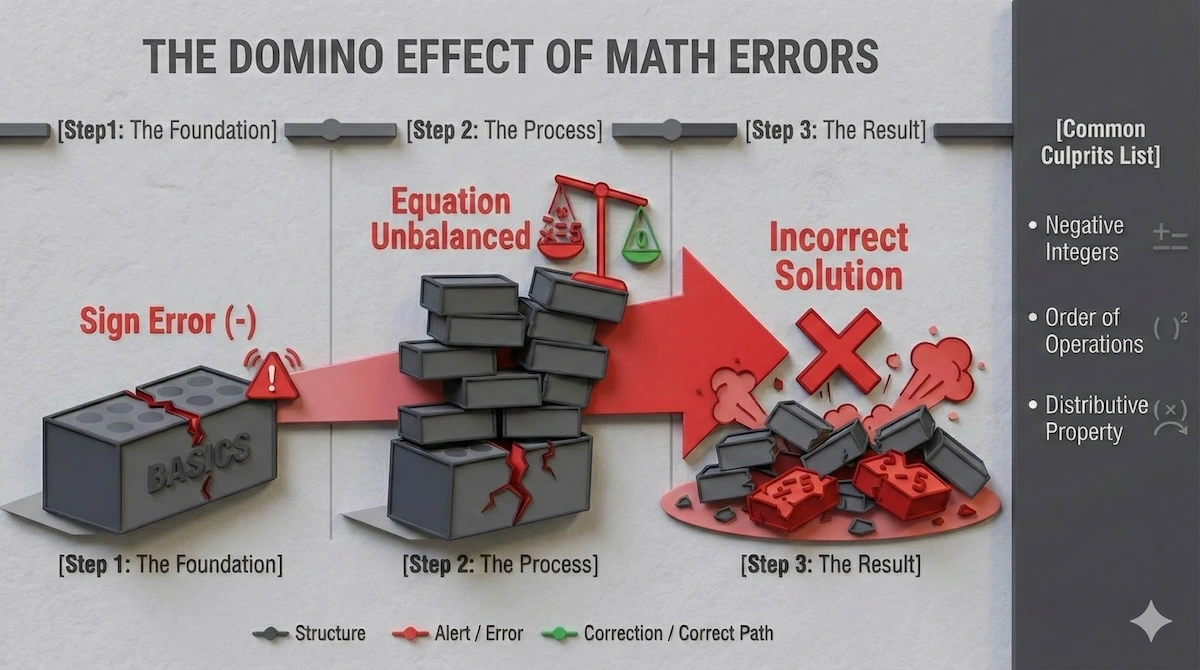
Small gaps in foundational knowledge, like negative numbers, cause major hurdles in advanced problem solving.
Addressing these foundational cracks early is essential. A tutor can spot these specific ‘cracked bricks’ that a classroom teacher might miss in a room of 30 students.
The Academic Impact
Research from the University of Chicago reveals that students with median-skill levels who received double-dose algebra instruction showed substantial improvements in college attendance and degree completion. For students induced to take enhanced algebra support, the percentage obtaining a college degree increased from approximately 12% to 17%, with four-year degree completion rising from 6% to 10%.
These findings highlight the transformative potential of intensive algebraic instruction, particularly when delivered through personalized tutoring approaches that address individual learning needs and mathematical anxieties.
The Science Behind Algebra Tutoring Effectiveness
Personalized Learning Approaches
Contemporary research demonstrates that algebra tutoring effectiveness stems from its ability to provide individualized instruction that adapts to each student’s learning pace and style. Unlike traditional classroom settings where teachers must address diverse skill levels simultaneously, tutoring environments allow for focused attention on specific areas of difficulty.
Studies examining peer tutoring in mathematics education found significant improvements in student achievement, with effect sizes reaching 1.07 in experimental groups compared to 0.483 in control groups using traditional teaching methods. This research indicates that personalized instructional approaches, whether delivered through peer interaction or professional tutoring, consistently outperform conventional classroom instruction.
Why is there such a performance gap? The difference lies in the structural advantages of one-on-one attention versus a crowded classroom environment.
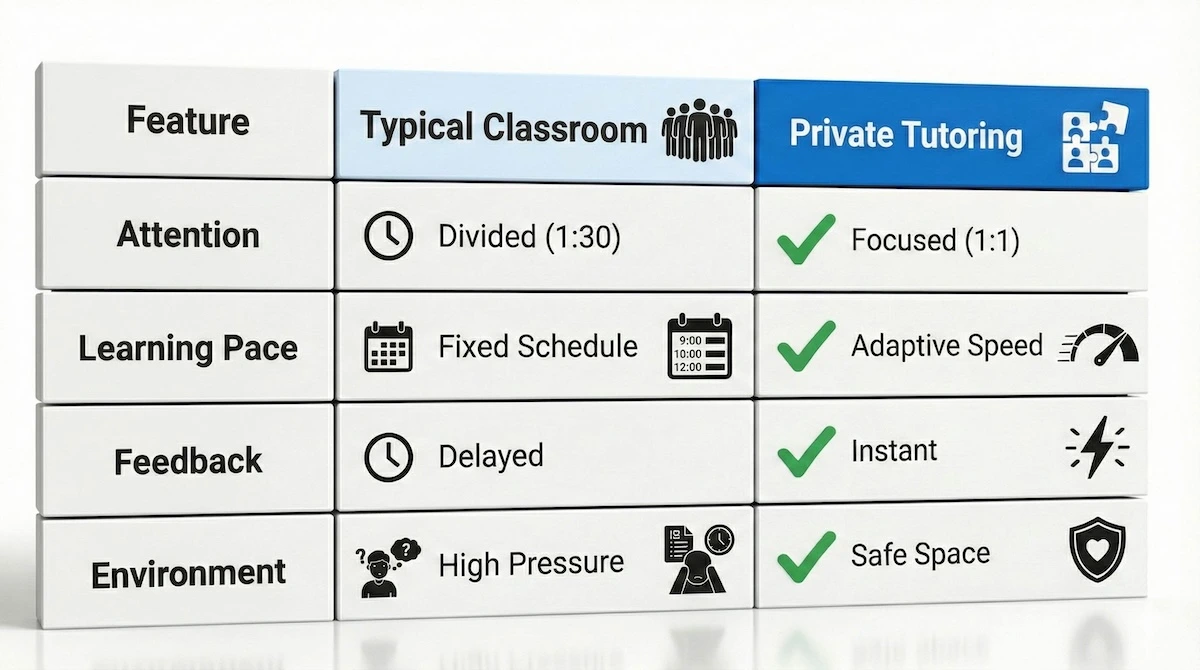
Private tutoring offers adaptive pacing and instant feedback that traditional classrooms cannot match.
The ability to adapt the pace to the student’s needs—speeding up when they ‘get it’ and slowing down when they don’t—is the primary driver of this success.
Cognitive and Emotional Benefits
Algebra tutoring online platforms have demonstrated particular effectiveness in addressing mathematics anxiety, a condition affecting approximately 20-30% of students and significantly correlating with poor mathematical performance. Research published in Nature demonstrates that math anxiety predicts both STEM avoidance and underperformance, with high math-anxious students taking nearly two fewer STEM courses per year and performing almost half a letter grade lower than their low-anxiety peers.
This anxiety creates a vicious loop that traps capable students. The diagram below illustrates how this cycle works and exactly where tutoring intervenes to break it.
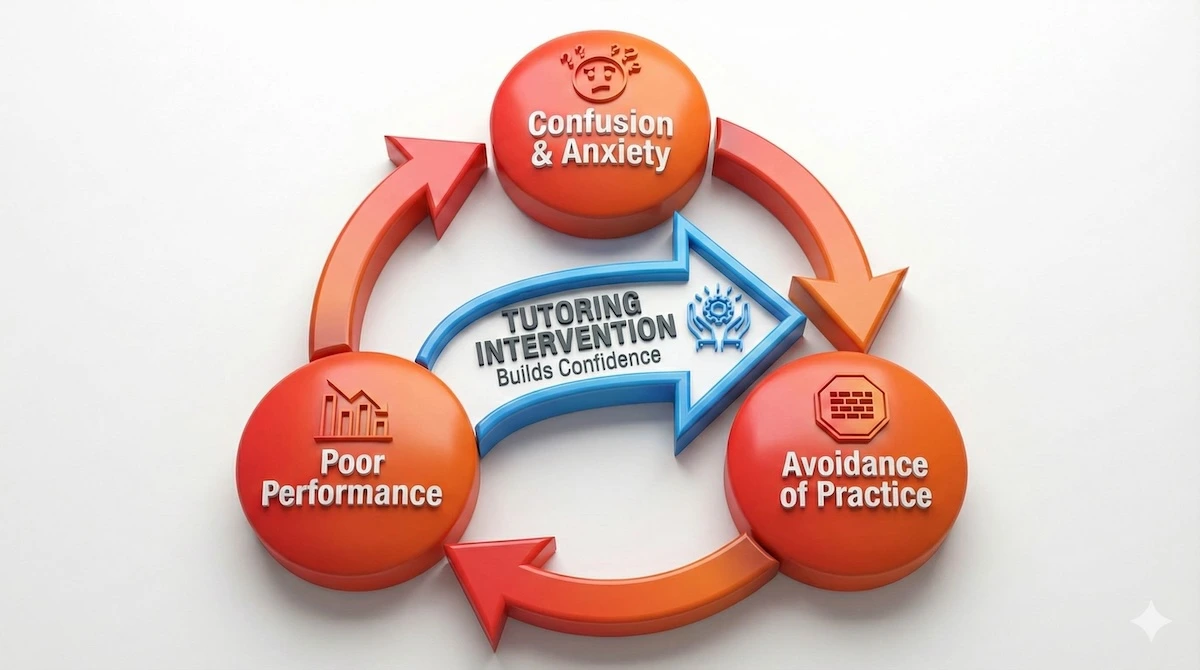
Tutoring interrupts the destructive cycle of anxiety and avoidance by providing a safe environment to fail and learn.
By providing a safe, judgment-free zone, professional tutors replace ‘avoidance’ with ‘supported practice,’ effectively rewiring the student’s emotional response to math.
Professional tutoring interventions address this challenge by creating supportive environments where students feel comfortable expressing confusion and asking questions. The resulting confidence boost often leads to improved performance across multiple academic subjects, not just mathematics.
Online Algebra Tutoring: The Digital Revolution
Technological Advantages
The transition to digital learning platforms has revolutionized algebra tutoring online delivery, offering unprecedented flexibility and accessibility. Current statistics indicate that online learning can reduce study time by 40-60% while maintaining or improving learning outcomes. Additionally, retention rates for online learners can reach up to 60%, compared to 8-10% in traditional face-to-face classroom settings.
Interactive technologies integrated into online tutoring platforms include virtual whiteboards, real-time problem-solving tools, and adaptive learning systems that adjust difficulty levels based on student progress. These technological innovations particularly benefit students who require visual or kinesthetic learning approaches to understand abstract algebraic concepts.
Global Market Growth
The online tutoring market reflects growing recognition of digital education’s effectiveness, with the global market projected to reach $23.73 billion by 2030, growing at a CAGR of 14.5%. In the United States specifically, the online private tutoring market was valued at $4.32 billion in 2024 and is projected to reach $8.08 billion by 2030.
This growth trajectory indicates increasing parental and institutional investment in personalized educational support, with particular emphasis on gateway courses like algebra that significantly influence long-term academic outcomes.
Specialized Support: Algebra Teachers and Homework Help
The Role of Professional Algebra Teachers
Qualified algebra teachers bring specialized knowledge that extends beyond content mastery to include understanding of common student misconceptions and effective pedagogical approaches. Research examining instructor impact on gateway mathematics courses found that teachers accounted for 34% of observed differences in student performance, more than twice the impact of students’ previous academic preparation.
This finding emphasizes the critical importance of working with experienced algebra tutors who understand both the mathematical content and the psychological aspects of learning. Effective tutors employ strategies such as:
- Breaking complex problems into manageable steps
- Connecting abstract concepts to real-world applications
- Providing immediate feedback and encouragement
- Identifying and addressing underlying mathematical misconceptions
Homework and Assignment Support
Algebra homework help represents a crucial component of comprehensive tutoring support, addressing the reality that many students struggle to transfer classroom learning to independent practice. Studies indicate that regular homework completion correlates strongly with course success, yet many students abandon assignments when faced with unfamiliar problem types or conceptual confusion.
Professional algebra assignment help services bridge this gap by providing guided practice opportunities that reinforce classroom learning while building student confidence. Rather than simply providing answers, effective tutoring focuses on developing problem-solving strategies and mathematical reasoning skills that students can apply independently.
Addressing Common Algebra Learning Difficulties
Identifying Core Challenges
Research consistently identifies several key areas where students experience difficulty in algebra learning:
- Conceptual understanding: Students often struggle to understand variables as representations rather than specific numbers
- Procedural fluency: Many students have difficulty applying learned procedures to new problem contexts
- Problem translation: Converting word problems into mathematical expressions remains challenging for most students
- Negative number operations: Basic operations with negative integers continue to cause confusion
Evidence-Based Solutions
Effective algebra tutoring addresses these challenges through research-supported approaches including:
- Multiple representation strategies that present concepts through visual, symbolic, and contextual approaches
- Scaffolded instruction that builds complexity gradually
- Explicit connection-making between new concepts and prior knowledge
- Regular assessment and feedback to identify and address misconceptions quickly
The Economic and Social Impact of Mathematics Education
Individual Benefits
The economic implications of algebra mastery extend well beyond academic achievement. College graduates earn 67% more than those with only high school diplomas, while individuals with strong mathematical skills see 10-15% higher lifetime earnings. These statistics highlight the long-term value of investing in quality algebra teaching and tutoring support.
Societal Implications
From a broader perspective, improved mathematics education contributes to national competitiveness in STEM fields and economic development. Countries with strong mathematical education systems consistently demonstrate higher levels of innovation and technological advancement, emphasizing the importance of ensuring all students receive adequate support in foundational subjects like algebra.
Choosing Effective Algebra Tutoring Services
Key Quality Indicators
When selecting algebra tutoring services, students and parents should consider several critical factors:
- Instructor qualifications: Look for tutors with relevant educational backgrounds and demonstrated teaching experience
- Personalized approach: Effective services assess individual needs and adapt instruction accordingly
- Progress monitoring: Quality programs include regular assessment and communication about student progress
- Flexible scheduling: Online platforms should accommodate diverse scheduling needs
To make this selection process easier, we have compiled a quick decision checklist. Use this guide to evaluate potential tutors for your student:
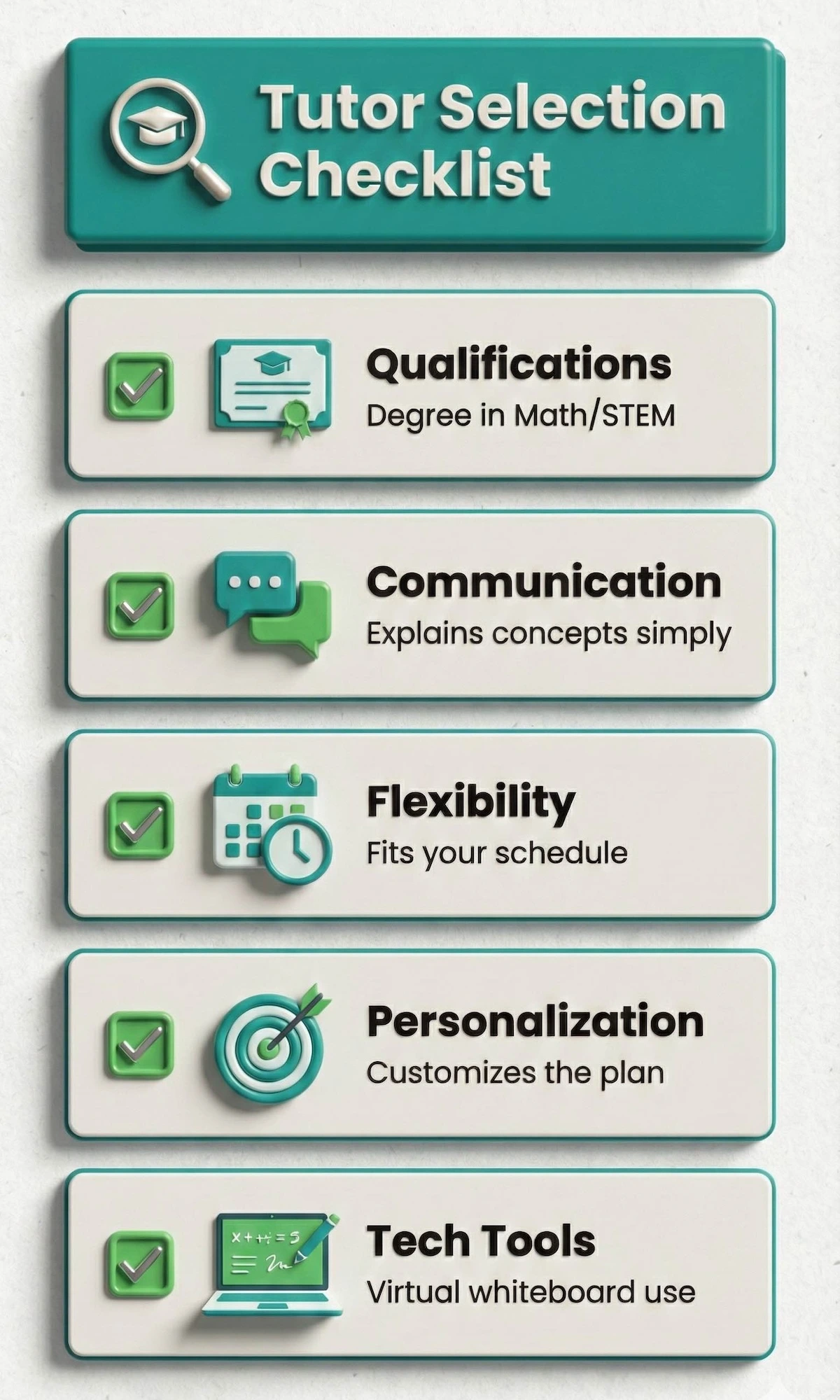
Use this checklist to ensure you select a tutor who can adapt to your specific learning needs.
If a service checks all these boxes, you can be confident that they will provide not just homework help, but true academic growth.
Cost-Benefit Considerations
While tutoring services represent a financial investment, research suggests that the long-term benefits significantly outweigh costs. Students who receive effective algebra support are more likely to pursue advanced mathematics courses, graduate from high school, and succeed in post-secondary education, outcomes that translate to substantial lifetime earnings increases.
Future Trends in Algebra Education
Technology Integration
Artificial intelligence and machine learning technologies are increasingly integrated into algebra tutoring online platforms, enabling more sophisticated personalization and immediate feedback. These technologies can identify learning patterns and adapt instruction in real-time, potentially improving efficiency and effectiveness of tutoring interventions.
Pedagogical Innovations
Current trends in mathematics education emphasize conceptual understanding over procedural memorization, with increased focus on real-world applications and collaborative problem-solving approaches. These shifts align well with tutoring environments that can provide individualized attention and flexible instructional approaches.
Conclusion: Investing in Algebraic Success
The evidence overwhelmingly supports the effectiveness of quality algebra tutoring in improving student outcomes across multiple dimensions. From immediate grade improvements to long-term career prospects, the benefits of investing in personalized mathematical education are substantial and enduring.
For students struggling with algebraic concepts, tutoring represents more than academic support—it provides a pathway to mathematical confidence, academic success, and expanded future opportunities. Whether delivered through traditional face-to-face interaction or innovative online platforms, effective tutoring addresses both cognitive and emotional barriers that often prevent students from reaching their full potential.
As educational systems continue evolving to meet diverse student needs, algebra tutoring will likely play an increasingly important role in ensuring equitable access to mathematical education and its associated benefits. The key lies in connecting students with qualified instructors who can provide the personalized, patient, and encouraging support necessary for algebraic mastery.
Frequently Asked Questions
Q1 How much improvement can students expect from algebra tutoring?
Research indicates students typically see 0.2-0.3 standard deviation improvements in test scores, equivalent to moving from a C to B grade average.
Q2 Is online algebra tutoring as effective as in-person instruction?
Studies show online tutoring can be equally effective, with some research indicating 40-60% reduced study time while maintaining learning outcomes.
Q3 How often should students receive algebra tutoring sessions?
Most research suggests 2-3 sessions per week of 30-60 minutes each provides optimal balance between support and independent learning.
Q4 What qualifications should parents look for in algebra tutors?
Effective tutors typically have strong mathematical backgrounds, teaching experience, and demonstrated ability to explain complex concepts clearly.
Q5 Can algebra tutoring help with math anxiety?
Yes, personalized tutoring environments significantly reduce math anxiety by providing supportive, non-judgmental spaces for learning and question-asking.
Q6 When is the best time to start algebra tutoring?
Early intervention produces best results, ideally beginning support at the first signs of difficulty rather than waiting for failing grades.
Related Subjects
ACCUPLACER Elementary Algebra
Advanced Algebra
Algebraic Topology
Business Math
Chaos Theory
Computational Mathematics
Continuity Equations
Continuum Mechanics
Dynamical Systems
Ergodic Theory
Functional Analysis
Linear Equations
Linear Systems
Mathematical Biology
Mathematical Logic
Mathematical Modeling
Mathematical Optimization
Measure Theory
Nonlinear Dynamics
Nonlinear Finite Element Analysis
Quadratic Congruence Equation
Ramanujan-Nagell Equation
Reeds-Sloane Algorithm
Ring Of Fractions
String Operations
******************************
This article provides general educational guidance only. It is NOT official exam policy, professional academic advice, or guaranteed results. Always verify information with your school, official exam boards (College Board, Cambridge, IB), or qualified professionals before making decisions. Read Full Policies & Disclaimer , Contact Us To Report An Error

